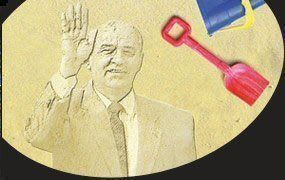I was out of town for press night and consequently saw Penny Gold's new play, co-produced with The Nuffield Theatre Southampton, a couple of days later than most of my critic colleagues. It seems they largely didn't like it. I did. Had there been changes to the script or the production that made a difference? A couple of textual hesitations suggest that there might have been, and with not enough rehearsal to make them smooth, but I was not aware of any major difference from the printed script. Perhaps I was just more in tune with what she was presenting.
The President is Mikhail Gorbachev, at the end of his family holiday at his rather grand official dacha on the Black Sea coast. The next day he is return to Moscow and is putting the finishing touches to a new treaty which will bring in liberal reforms. This is the day in August 1991 when a delegation from the Central Committee arrives to demand he withdraw his plans or they will declare a state of emergency. The place is surrounded by troops. The family are prisoners and there may be worse to come. When an iced cake is brought in you almost want to call out 'Don't eat it!'
The production is not entirely successful in suggesting that beyond their private quarters the building is swarming with secret police and military. The KGB officer who is supposed to be Gorbachev's protector, but who sides with the opposition, is their only representative that we see. Robert Demeger gives him a strange mixture of subservience and menace.
Nevertheless the atmosphere builds in tension, helped by a sequence of sound and projected images that begin to appear between scenes. At first they seem to suggest that the Gorbachev family is being forced down into the cellarage, but soon one realises that these are a recurring echo (the playwright's word in her script) of an earlier sequence of events: the imprisonment of the Romanov family at Yekaterinburg, made more poignant by the fact that Gorbachev's younger granddaughter is called Anastasia. We all know what happened to Tsar Nicholas' and his wife and children and, despite our after knowledge of the Gorbachev situation, at the time that seems a real possibility for the President and is family.
And it does feel like a real family, with its own quirky tensions, created largely by the fine performance of Isla Blair as the President's wife Raisa, on whose diary the play is partly based. Julian Glover, with a gravitas to his voice I have not before been so aware of, gives us in his Gorbachev a man exuding confidence and calm as he bottles up his growing concern for his family and for his idealistic plans for the future. The playing of this relationship is beautifully balanced, full of tenderness and undercurrents of feeling.
This is not really a play of political argument. We do not get an exposition of political theory either from Gorbachev or from his opponents, though the case for his enemies' action is given voice as well as the President's idealism. This is really about standing firm to your beliefs, whatever they are. Though perhaps you do need to be someone who can agree that a brave man on a tractor is an heroic and beautiful image to identify completely.
The first act left me feeling there was something awkward about the writing that the actors were not always able to disguise but gradually the emotion won me over. Robin Don has designed a room of comfortable opulence, placing it in a cartouche that makes it a kind of symbolic enclave with token rocks and seaside props that suggest it is right on the shoreline and helps to provide a balance between naturalism and the symbolism of this presentation of an event that changed the world.
I think he, or director Patrick Sandford, goes too far in having a collapsing set to represent the collapse of Soviet Communism when Yeltsin seizes power - in recent years that has become a theatrical cliché. Nor does it ring true to use the Gorbachev grandchildren to represent the way in which moneyed Russians have embraced Western consumerism to excess.
But Gold has effectively captured the tragedy of the moment when ideals and hope for the kind of Socialism which might have been born out of Perestroika and Glasnost were shattered and the former USSR turned into nationalist antagonism, and the mixture of greed and poverty that has replaced that dream. She has given a sort of requiem for that hope, though I think she may have intended to produce a response that was more positive.
Until 16th February 2008
